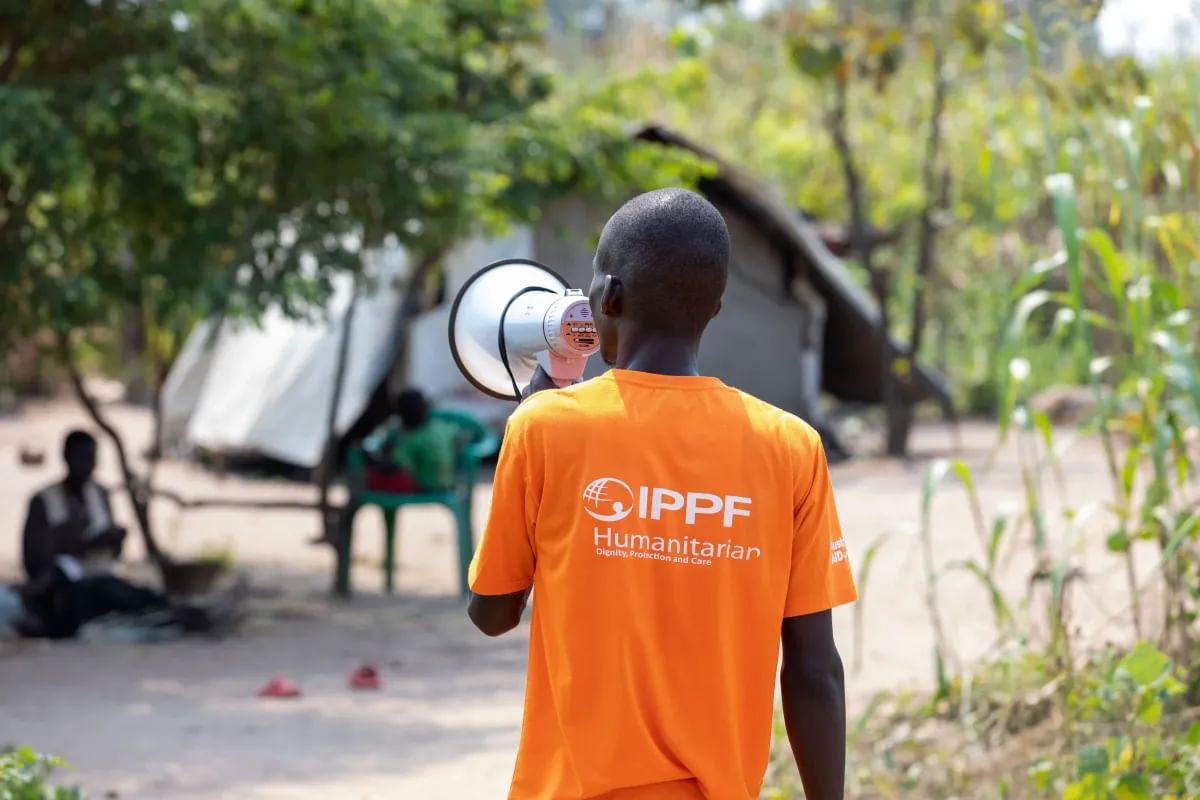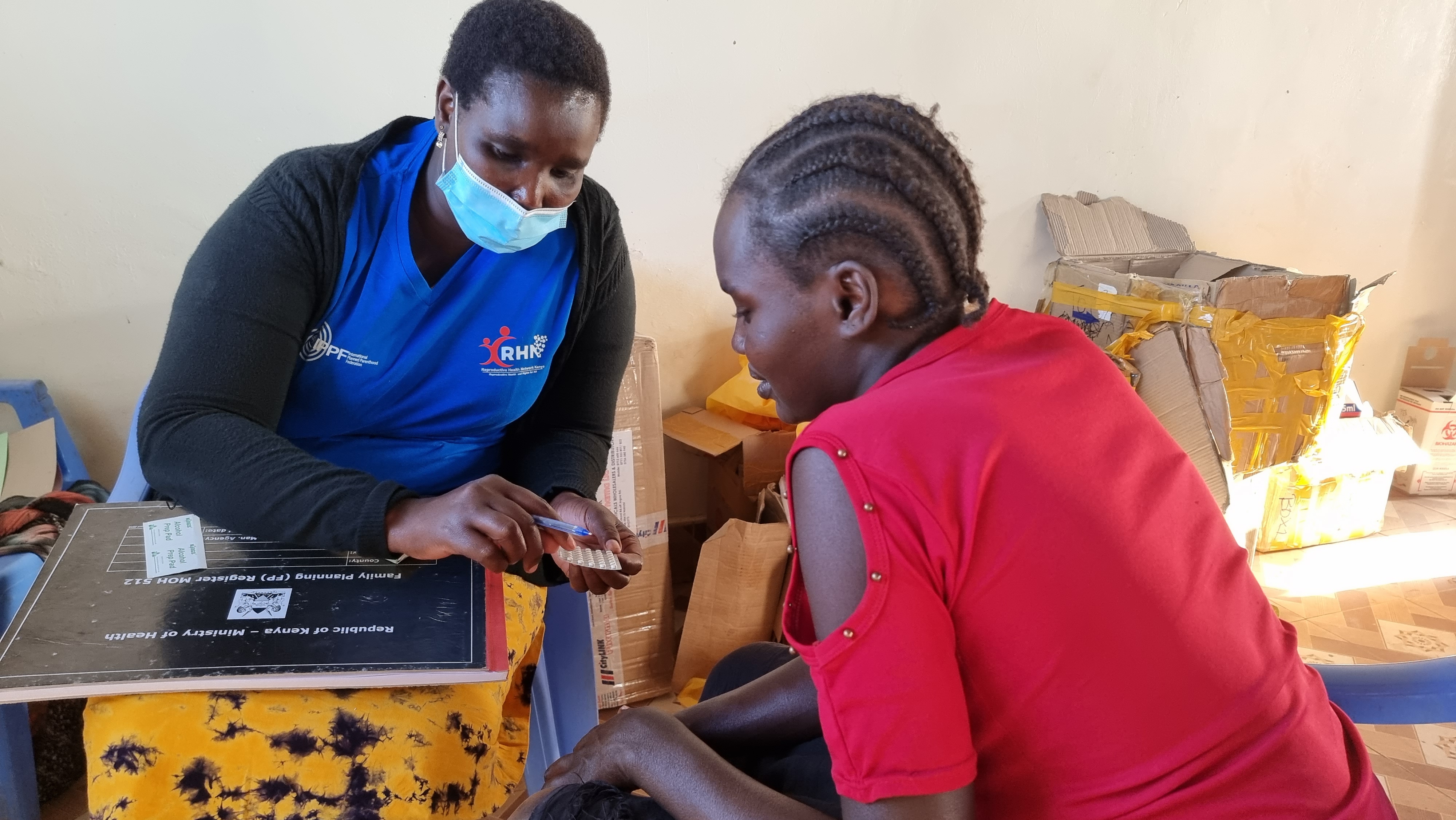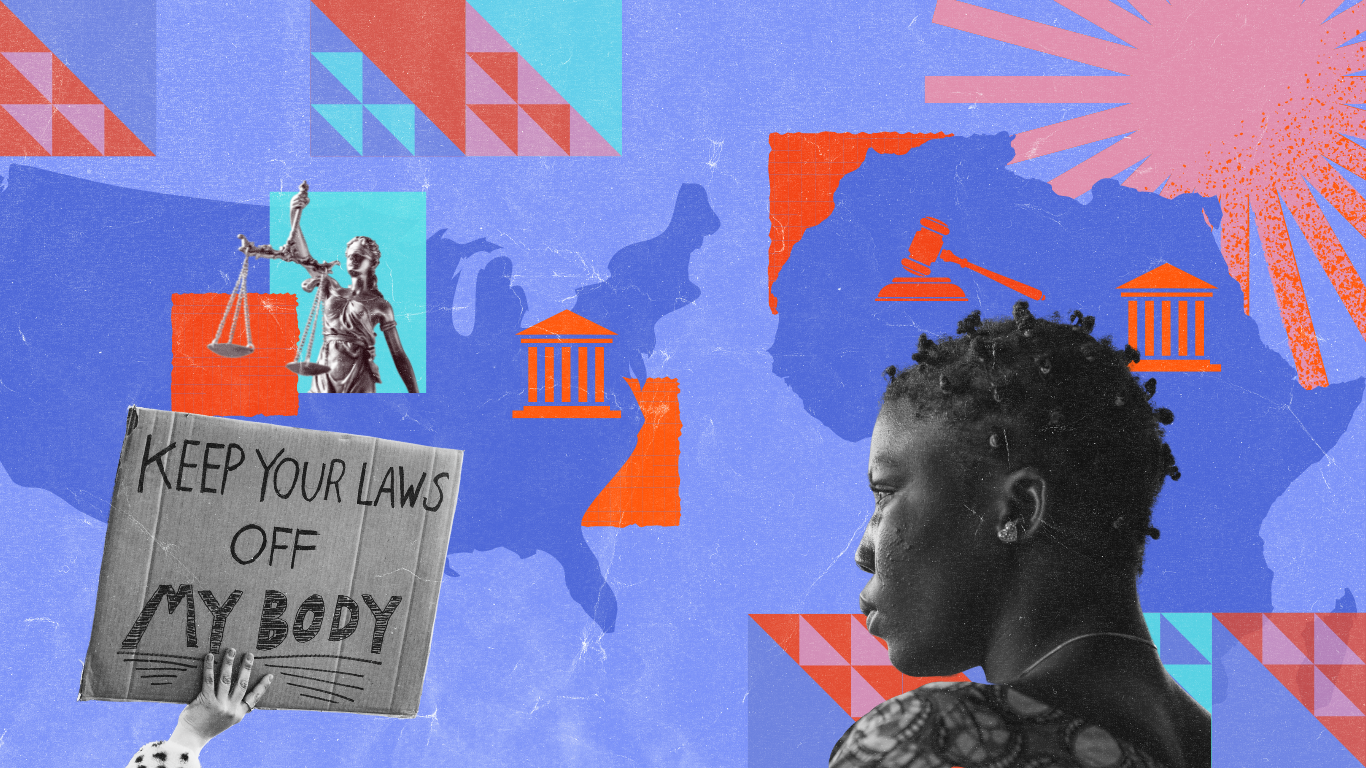
Mallah is the Lead, SRHR Architect of Cooperation at IPPF Africa Regional Office. Here, she supports the growth and development of Member Associations and Collaborative Partners while leading strategic direction and leadership on SRHR, and driving sustainable, innovative and cost-effective strategies to deliver quality, rights based and comprehensive SRHR information, services and programmes.
Articles by Mallah Tabot

How can we lead when the rules are unpredictable, the playing field is uneven, and the very legitimacy of SRHR is under siege?
In the global fight for sexual and reproductive health and rights (SRHR) within the current political climate - which includes massive funding cuts from the US Administration, it is increasingly becoming apparent that power rarely lies where we assume it does. Ideological currents, donor politics, judicial decisions, and cultural backlash (all powerful forces shaping this ecosystem) are often beyond the control of service providers, civil society actors, non-profit organizations and even governments (those who do the work). And yet, the expectation remains: deliver, scale, survive, thrive.How?For those of us working at the heart of the SRHR movement, this paradox is familiar. The terrain is political, volatile, and deeply unequal. When major funding decisions can be reversed by a single election, when misinformation campaigns can undo years of work, or when legal restrictions can criminalize healthcare provision suddenly, then the illusion of certainty and control becomes dangerous. Not only are we not governed by conventional market logic, but the unpredictable influence of non-market actors including religious groups, social movements, philanthropies, and international institutions whose priorities can shift overnight, ultimately shape our work. The recent dismantling of USAID is a sobering reminder of just how vulnerable we are as a sector. Unlike the Global Gag Rule, which followed an ideological cycle we had learned to anticipate, this decision came without warning, without precedent, and without the usual window for contingency planning. It exposed the fragility of our sector, not just to political tides, but to a global funding architecture that remains deeply skewed and susceptible to ideological interference. It is in this context that leadership must be reimagined.This moment demands a deeper reckoning: how can we lead when the rules are unpredictable, the playing field is uneven, and the very legitimacy of SRHR is under siege?The SRHR ecosystem sits at a high-stakes intersection of health, human rights, gender politics, and development. It is as much about clinics and commodities as it is about movements and messaging. Success is not only measured in service delivery numbers or program outcomes, but also by how well we navigate ideologically charged environments, how effectively we influence policy debates, and how resilient we are in the face of organized opposition. SRHR work is inherently political - no matter where we position ourselves on the spectrum. And political work demands political strategy, even when we’d rather stay neutral. This time, neutrality didn’t protect us. As we saw with USAID, they came for us all.Are we truly acknowledging that survival can no longer depend on the ‘chop wipe mouth’ mentality, as we say in Pidgin – the notion of silently complying from the sidelines, discreetly signing documents and collecting cheques while the ‘abortion providers’ stand by, waiting for the next four-year cycle? The time for passive acceptance has passed; we must now recognise that survival requires active participation and meaningful change, not just quiet endurance.Are we developing the capacity to collectively anticipate, influence, and position ourselves proactively by strategically engaging with both market and non-market forces? Do we better understand the interplay of these forces and refuse to be caught off guard by predictable surprises? Are we done playing catch up or playing the neutral gatekeeper of the status quo?Too often, our sector becomes fixated solely on programmatic delivery, adopting a market-driven management approach: setting targets, optimizing processes, tracking performance, and demonstrating impact. However, this framework risks overlooking the deeper realities of our ecosystem. What we truly need is a more worldly approach—one that centres context, embraces systems thinking, and recognises the complex interplay of power, policy, and people. This mindset is part of a new wave of thinking I have been exploring thanks to the International Masters Programme for Managers, IMPM, and one which I hope can be integrated more consciously into how we work as organizations in a volatile sector.At the International Planned Parenthood Federation (IPPF), this shift is already underway. In the wake of recent shocks, we are rethinking what it means to be resilient - not just operationally, but politically. We’re asking the tough questions: How can we anticipate change sooner? How do we build influence with non-traditional allies? How can we reimagine our systems to respond more quickly and intelligently to emerging threats, and how do we safeguard against funding losses?Following a Federation-wide survey of our Member Associations and Collaborative Partners, IPPF has set up a Harm Mitigation Taskforce to assess the evolving crisis and fast-track emergency funding to the most severely impacted affiliates. The first round of grants was disbursed in May 2025 to ensure the continued delivery of essential healthcare services and uninterrupted access to life-saving health commodities.While we cannot fully replace the funding losses, we can strategically inject resources to sustain life-saving services during such challenging times. Our partners on the ground are already doing this, delivering services in some of the world’s most challenging contexts. They are adapting their care pathways, diversifying partnerships, and pivoting their advocacy - all because they are deeply committed to their communities and trusted by them.This moment also calls for a new orientation to leadership that moves beyond control and toward systems stewardship, because the leaders who will matter most in the coming decade are not those who can manage efficiently in stable times, but those who can read the landscape, anticipate shifts, build coalitions, and challenge the status quo. They are comfortable working in ambiguity, they ask better questions, and crucially, they understand that reclaiming agency does not mean eliminating uncertainty but rather learning how to lead within it.While the sector often feels like it is in constant crisis mode, there is a deeper truth here: moments of disruption, however painful, also open space for reinvention. Crises expose weak points, surface unspoken dependencies and challenge outdated mental models. But they also present a window, however small, to lead differently. Are we listening?At IPPF, we are using this window to ask ourselves what kind of institution we want to become. Not just one that adapts, but one that influences. Not just one that delivers services, but one that shapes systems. And not just one that survives shocks, but one that helps build a future where such shocks are less likely, less devastating, or more equitably absorbed.This is not easy work. It requires confronting deeply embedded assumptions about what leadership is, how change happens, and who gets to drive it. It demands that we embrace both the visible and invisible forces shaping our context. And above all, it requires that we lead not from a place of fear or reaction, but from a deep, unwavering commitment to the world we are trying to build. We can do more than respond – we can lead.

Two Years Post-Roe: Africa's Path to Reproductive Justice
June 24th this year marks the second anniversary of the repeal of Roe v. Wade, a seismic shift in the landscape of reproductive rights that has reverberated far beyond the borders of the United States. In June 2022, the US Supreme Court overturned the landmark 1973 ruling which had established a woman's legal right under the US Constitution to have an abortion. This repeal has had global repercussions, further emboldening anti-abortion movements, and influencing reproductive rights debates, policies, funding, and services. In Africa, not only did it send shockwaves, but has also prompted a reflection and re-evaluation of our role as African stakeholders in shaping the future of reproductive rights everywhere on the continent. In many countries on the continent where access to abortion care is already fraught with challenges, this development serves as a stark reminder of the fragility of reproductive rights. It highlights the danger of complacency and the need for vigilance in protecting and advancing these rights and reminds us that abortion is not a moral issue for debate, it is healthcare, and a fundamental human right. While the repeal has sparked renewed activism and advocacy for rights actors on the continent, it has also further emboldened conservative factions and a growing anti-rights movement to push for more restrictive laws and policies through novel tactics to further their agenda. Under the guise of protecting the family, anti-abortion narratives are used as entry points to infiltrate political, legislative and advocacy spaces to roll back hard-won gains. Even going as far as setting up alternative research institutions in Africa to generate quasi-scientific evidence to counter reputed research bodies like the Guttmacher Institute. Increasingly, a key tactic is the weaponizing of First Ladies to further the anti-rights agenda. In Kenya, the National Family Protection Policy, drafted by a major anti-rights group, Citizen Go was launched by the First Lady, despite not undergoing public participation and receiving lots of criticism from rights actors. In Uganda, the Geneva Consensus declaration, an anti-abortion joint statement is making inroads in the country through its affiliation with the First Lady, even though the “Consensus” has no legal or policy underpinning. This trajectory underscores a critical reality: Nothing is safe, our continent is a battleground for the ideological struggles taking place elsewhere in the world, sadly, our human rights, including SRHR are at the highest risk. We must forge our own path, grounded in the unique political contexts of our nations through our partnerships with local organizations and governments. As one of the leading voices on SRHR advocacy and services in Africa, IPPF believes now is the time for Africa to assert its leadership in the global fight for reproductive justice. In collaboration with other key actors on the continent and beyond, IPPF is committed to continue playing a pivotal role in the SRHR landscape of Africa. We will continue to expand access to abortion care, especially for the most vulnerable and marginalized, comprehensive sexuality education, contraceptive services and reaching those in humanitarian settings. Despite these efforts, much work remains. The disparities in access and the entrenched stigma surrounding abortion care continue to hinder our progress. One of the key initiatives we are proud to be part of is the CATALYSTS Consortium, which was born out of this landmark ruling in June 2022. Following the ruling, IPPF Africa Region, Ipas Africa Alliance, Centre for Reproductive Rights Africa, Population Council Kenya and FIGO came together to discuss the ruling’s implications on the continent and consider the case for an abortion consortium that might more effectively protect and promote abortion rights in Africa. Launching on June 27th, the Consortium has set an ambitious and unambiguously comprehensive vision for abortion care for all in Africa. This type of organic consortium on abortion has not yet been attempted. As African thought leaders, field builders and a vehicle for driving accountability, we are a Consortium of the brave with a track record of never backtracking. Our solution is powerful, impactful, and led by those doing the work while building an African critical mass that can effectively open doors, advocate more strongly and underpin bolder action. CATALYSTS is Africa-led, committed to decolonizing, and reframing the discourse around abortion rights in Africa by centring African perspectives, experiences, and voices. But we cannot achieve our goals in isolation. It is imperative that African governments, activists, youth groups and other civil society groups recognize the urgency of prioritizing reproductive rights. Governments must decriminalize abortion, ensure access to contraceptives, and protect the rights of individuals to make informed choices about their reproductive health and rights. Cross-border activist solidarity is imperative if we must move the needle on reproductive justice, and young people should be recognized as not just a passive group with SRHR needs but as critical actors at the centre of the journey towards reproductive justice. IPPF ARO stands ready to champion this charge, but we need the support and collaboration of governments, communities, and international partners. CATALYSTS launches on June 27th after close to two years of consultation, course correction, investment, and realignment. I invite you to join us in bringing this vision to life, which will be marked by the unveiling of the website, Theory of Change, and call to action. It promises to be a celebration of our collective achievements and a testament to the transformative power of collaboration. As we mark the second anniversary of the Roe v. Wade repeal, the stakes could not be higher for African SRHR actors. The urgent need for a unified and proactive approach to safeguard and advance reproductive rights on the continent is imperative as the path forward requires bold action, unwavering commitment, and a collective direction. For us, the lesson is clear: They are coming for us, bolder, stronger, and more organized, and we cannot depend on the legal frameworks or political will of foreign nations to safeguard our reproductive rights. Instead, we must strike back and reclaim our narrative, and enforce our own robust policies that reflect the needs and realities of our people.

Reimagining family planning: beyond opinion leaders and service uptake indicators
This featured perspective was originally published as a Comment in The Lancet, Vol 11, December 2023. Click here to view the original or scroll down to download the PDF. In The Lancet Global Health, Agrey H Mwakisole and colleagues explore the role of Christian religious leaders in promoting family planning in rural Tanzania. Given the roles that religious leaders can hold as trusted community messengers, the Article provides strong recommendations for including them in family planning initiatives, suggesting that, as an innovative and adaptable strategy, it could contribute positively to global initiatives towards universal access to modern contraception, if implemented broadly. The researchers also engaged equal numbers of male and female religious leaders, and data from this study suggest that the intervention increased women’s autonomy to choose to use contraception. There are a lot of data to support this approach. Faith leaders have been shown to hold power as opinion leaders and critical agents of change, with a study demonstrating the improved effectiveness of health behaviour change programmes focused on concerns such as nutrition and fitness when provided by members of the clergy. When it comes to sexual and reproductive health and rights (SRHR) issues such as access to contraception, a study substantiates this correlation that religious leaders can improve access to contraceptives, especially in settings where religion plays an important role in the socioeconomic fabric of society. In this Comment, we challenge readers to question some of the bigger implications of this strategy, and how, although effective in facilitating uptake of contraceptive services, engaging religious leaders could reinforce existing power dynamics and potentially compromise women’s autonomy and decision making, especially when it comes to realising their reproductive intentions. We also worry about the continued emphasis on contraceptive uptake as the most important indicator in the global family planning community, and finally encourage the move from family planning as a siloed issue in reproductive health, to one shaped by deeper social, economic, and cultural factors.

One year post-Roe, Africa finds itself at a critical juncture for reproductive rights
On 24 June 2022, the US Supreme Court overturned Roe V Wade in a landmark ruling that removed the constitutional right to abortion. The repeal means the US joins just three other countries - Poland, Nicaragua and El Salvador - that have removed legal grounds for abortion since 1994. In contrast, 61 other countries have liberalized abortion laws - some of which came in direct response to the repeal of Roe v Wade. While we grapple with providing safe abortion care in these uncertain times, we are reminded that countries like the US, which have historically set the global abortion agenda, are no longer the right or the only leaders. In Africa, we find ourselves at a critical juncture. Amidst these challenges, there have been significant triumphs that inspire hope for a future where reproductive justice is upheld. For example, one month after the US ruling last year, Sierra Leone approved a draft law to decriminalize abortion, in a monumental step towards the repeal of its colonial-era laws. Benin has also enacted one of the most progressive abortion laws in Africa, demonstrating the potential for change even in the face of adversity. In Kenya, the High Court ruled that safe abortion is a fundamental right, and that arbitrary arrests and prosecution for seeking or offering such services are completely illegal.









